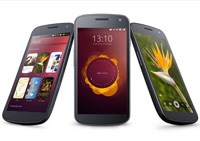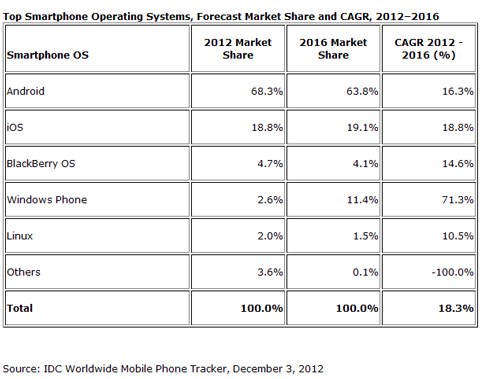Mark Shuttleworth, South African IT millionaire and Open Source Champion recently announced and demonstrated the planned release of the Linux-based Ubuntu operating system (OS) for smartphones. The Canonical boss revealed that future devices will not only run the new mobile OS, but will also boot the desktop variant of Ubuntu when docked to a keyboard, mouse and monitor. This would mean that you will literally be able to use your phone to power your PC.

(Image: Ubuntu)
It is planned that you would be able to install Ubuntu on most Android devices, and although it is a totally new OS (not just an Android skin), because it is built on Linux in the same way that Android is, there should be no problem installing it on modern Android phones.
Visually the phone interface is very clean and makes no use of permanent buttons, instead the system is totally gesture-based and different functions are triggered by swiping the phone from sides or top or bottom, similar to Windows 8. From an overall design perspective, Ubuntu looks to offer a pretty dynamic home screen experience that's quite a bit different to Windows Phone, Android, or iOS. It's focused more around recently used content - like contacts you've spoken to recently, music you've added, and apps you've used - rather than a static grid of content.
During his keynote address earlier this year, Shuttleworth continually referred to 'emerging' markets as the battleground on which an Ubuntu Phone would fight it out for impact... "It's this sector, the low-end, that the battle for the hearts, minds and hands of the less tech-savvy will take place."
However, while Canonical has plenty of experience hosting cloud-based services and app stores (a major hurdle for new entrants to the mobile space), it doesn't have a great track record in bringing physical products to market that use its software. Hopefully, application developers will take the lead in ensuring a stream of new and exciting applications.
So, although a low-cost platform has appeal for handset manufacturers, there's hardly a shortage of them to choose from right now, with Firefox OS and Tizen being the most recent examples of what can be achieved by fully embracing and supporting HTML5.
An Android alternative
Carolina Milanesi, mobile analyst at Gartner, feels that there is place in the marketplace for an alternative platform to Android.
"There seems to be some interest in alternative platforms to Android. This is driven on the one hand by vendors that do not want to put all their eggs in a basket by supporting only Android, and also by operators who do not want to become too dependent on Google," says Milanesi. "Device ASP (average selling price) is another reason that carriers consider, although I believe that this is less of an issue today than it was a year ago."
Of course, Canonical's trump card is its vision for running the same core Ubuntu platform across all devices. But whether handset manufacturers or mobile operators share that vision is another matter.
So how will this new boy on the block stack up against the gang that controls the market fiercely?
Android has taken total control of the smartphone market - with third quarter2012 sales worldwide indicating a staggering 75% of the 181 million phones sold are running Android OS, with Apple controlling about 15% and all the other players fighting it out for the remaining 10%. (Figures supplied by market analytics group IDC).
The figures for 2012 are equally impressive:
This report from the IDC was compiled before Canonical made their announcement on 3 January of the planned Ubuntu phone. I believe the Linux market share will grow significantly over the next two years - dependent largely on Canonical's ability to get the new operating system into the market as soon as possible.
Corporates like high levels of privacy, security
The one large group which will affect the possible success of the new phone OS is the enterprise group. Ubuntu will deliver the best management of BYOD with Landscape and has the highest level of security and privacy protection. Corporates like that. The scalability of Ubuntu is the best in the world; no other OS can even dream of competing with Ubuntu. From a low-end phone up to a supercomputer will all be possible with one system. Ubuntu not only makes it possible, Ubuntu is tried and tested and very entrenched in enterprise IT thinking. Canonical have proven that they can deliver. So the threat for Apple, Google etc is real, although in the big numbers game - this is probably not a significant threat. Microsoft is the company most likely to be affected by the new OS. Windows 8 is having a very lukewarm reception from the public and it is likely that people seeking an alternative to Android will look at the Ubuntu phone. However, Microsoft has the financial muscle to maximize ad spend to sell its phone offerings - and it is hard to fight against massive marketing campaigns. Canonical will just not be competing at the same level as Microsoft.
Looking again at the total market - the high profile status phones will stay with the big boys, but Shuttleworth is committed to offering a solution for developing countries and buyers who want the features and functionality of a smartphone without the cost of the top-end brands. And this is where the Linux phone may just surprise everyone. Africa, India, China, and South America - the potential market for a low cost smartphone is huge, and Linux is already well known in these areas. Add to this the ability to drive a computer and there may be some interesting developments far away from so-called first world.


































